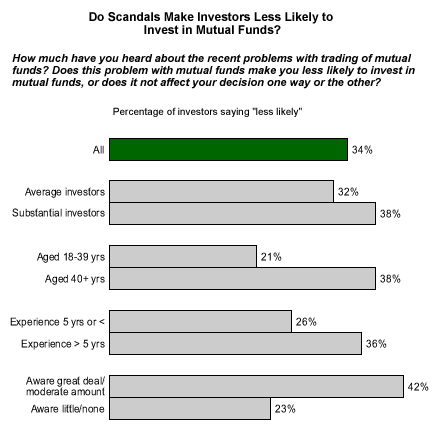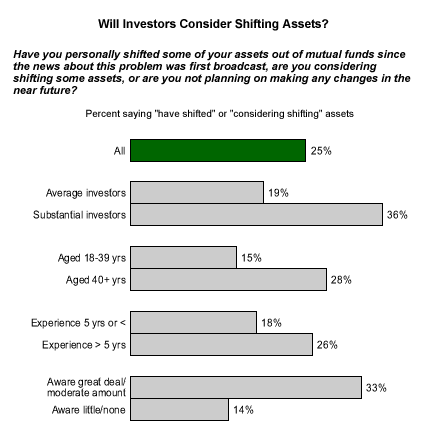Mutual funds are key vehicles for American investors. According to the Investment Company Institute, nearly half of U.S. households own mutual funds. A third of households hold mutual funds in employer-sponsored retirement plans, and about the same percentage own mutual funds outside of those plans. As a result, investors' reactions to the current mutual fund scandal have enormous implications for the money markets and the economy as a whole.
The December UBS/Gallup Index of Investor Optimism survey* provides some good news for mutual fund companies. Two-thirds of investors say the scandals have not affected their decisions to invest in mutual funds. More importantly, three-fourths say they have not shifted, and do not plan to shift, any of their assets out of mutual funds in response to the scandal.
On the other hand, the older, more experienced investors are most likely to say the scandal makes them less likely to invest in mutual funds, and to say they are considering moving their assets to other investments. Also, three in four investors -- regardless of age, experience, or awareness of the mutual fund scandal -- say they would move their money out of a fund that admits wrongdoing.
Some Investors More Affected by Scandal Than Others
Index results indicate that substantial investors (those with more than $100,000 in investable assets), investors over 40, investors with more than five years of experience, and investors who have heard a great deal or moderate amount about the mutual fund scandal are more likely than their counterparts to say that the scandals have made them less likely to invest in mutual funds. Along the same lines, each of these groups are also more likely than others to say they either have shifted, or would consider shifting, their money out of mutual funds.


Good News for Banks?
Right now, Wall Street seems to have a fairly benign view of the impact the scandal is having on investors. For example, one fund research firm (Lipper) points out that the funds receiving the most negative publicity from the scandal suffered combined outflows of $21.3 billion in November, while U.S. equity funds reported overall inflows of $22 billion. Lipper's conclusion is that though many investors are leaving the firms directly affected by the scandal, instead of leaving Wall Street, they are simply shifting their money into other mutual funds.
This may be the case. However, we can't ignore the potential cumulative impact of all the recent scandals on Wall Street. Investors are still greatly concerned about the corporate accounting and governance abuses of the past couple of years. Now they find out that the investment mechanism they thought was most immune to abuse has also been scandalized by the excessive greed of a few. Making matters worse for the funds, the older, more experienced investors are the ones who say they have already or are considering moving their money.
In 1980, only 5.7% of U.S. households owned mutual funds. By 1990, this percentage had increased to 25%, and it now stands at 47.9%. Where will the money go if investors continue to lose confidence in Wall Street? Most likely, some would go back to where it was in the 1970s and 1980s -- banking institution CDs.
Federal deposit insurance exists to provide investors with a safe investment mechanism and preserve capital above all else. Of course, at today's interest rates, these investments are not very attractive unless you begin to doubt the safety of your other investment options. In this context, growing investor concerns about mutual funds could lead to re-intermediation -- the return of money to depository institutions -- as part of a "shift toward quality." This shift would be good news for banks, increasing their source of low-cost deposits, but bad news for the economy, because it would reflect a growing lack of confidence in Wall Street.
No one expects investors to begin shifting their money away from Wall Street. If anything, the recovery of the markets and continued growth of money funds suggests the opposite. Still, as those on Wall Street enjoy the holidays, they should be thankful that investors continue to show confidence in mutual funds and corporate America. They should also resolve to do everything they can to eliminate the potential for additional scandals in the years ahead.
*Results are based on telephone interviews with 803 investors, aged 18 and older, conducted Dec. 1-14, 2003. For results based on these total samples, one can say with 95% confidence that the margin of sampling error is ±4 percentage points.

